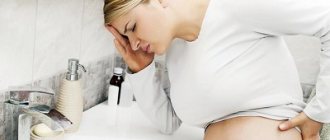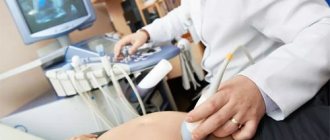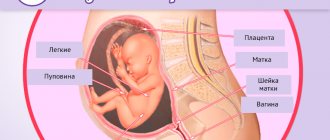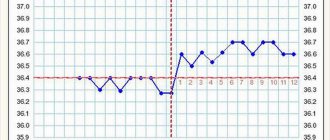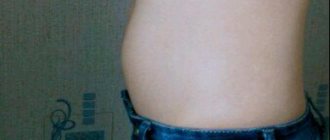Diarrhea during pregnancy: possible causes
- The first trimester of pregnancy is characterized by changes in the functioning of the digestive system. There is a change in taste, “whims” in food intake appear, nausea and vomiting often occur - all these are signs of toxicosis. With changes in diet or the appearance of unusual foods on the menu, relaxation and increased bowel movements may occur. If there are no spastic pains, impurities in the form of mucus or blood, feces in the usual volume or a little more, it may be enough to adjust the diet. The stool returns to normal without treatment.
- Often in the early stages of pregnancy, medicinal forms of vitamins and microelements are prescribed, and for concomitant diseases, women take certain medications as prescribed by a doctor. Many medications can cause diarrhea during pregnancy: Magnesium-B6, other multivitamin and mineral supplements, folic acid.
- During the second trimester, a pregnant woman's body is prone to insufficient digestion of food, which can lead to diarrhea.
- During late pregnancy, a woman’s body experiences increased production of prostaglandin hormones, which leads to bowel cleansing, a necessary process that precedes childbirth. In this case, diarrhea begins almost before contractions.
- As the uterus grows, the load on the entire gastrointestinal tract increases, the organs of which are compressed and displaced, which can lead to disruption of the process of complete digestion of food. Frequent diarrhea may occur, especially if the pregnant woman already has gastroenterological diseases.
- The entry of various microorganisms into the body of a pregnant woman can cause serious illness. Intestinal infections, food poisoning, and parasitic diseases occur with very serious symptoms. They are accompanied by diarrhea and vomiting, high body temperature, signs of dehydration, severe weakness, and severe abdominal pain.
- The presence of diseases of the endocrine system in a pregnant woman - diabetes mellitus, Addison's disease, thyrotoxicosis, adrenal insufficiency - can cause hormonal imbalance, accompanied by diarrhea.
- Reactions of a neurogenic nature (the so-called “bear disease”).
Is diarrhea dangerous during pregnancy?
Under some conditions, diarrhea in pregnant women can become a dangerous condition, even life-threatening - both for the unborn child and for the mother. Symptoms for which you should seek medical help:
- prolonged course of diarrhea without spastic pain, but without a tendency to consolidate stool;
- frequent (more than 3 times a day) and heavy stools for more than 1 day;
- admixture of mucus, blood or other inclusions in the stool;
- accompanying nausea, vomiting;
- loss of appetite up to refusal to eat food and water;
- spasmodic abdominal pain;
- increased body temperature;
- general weakness, malaise;
- headache and muscle pain.
If there is at least one of the listed symptoms, there is a danger of dehydration of the woman’s body and deterioration in the condition of the fetus. In this case, the pregnant woman needs immediate medical care aimed at restoring water and electrolyte balance. In the absence of these symptoms and diarrhea that appears after eating, the pregnant woman’s diet should be adjusted to avoid loss of beneficial nutrients.
Treatment of diarrhea
Treatment of diarrhea in pregnant women should be carried out under the supervision of a specialist. It is highly undesirable to take medications that have a temporary effect on your own. Most of them are harmful to the unborn child. Medicines for pregnant women for diarrhea should be recommended by a doctor. Then they will successfully relieve unpleasant symptoms and maintain the woman’s health without causing damage.
We recommend: Diarrhea in women during menstruation - 5 main causes and treatment methods
If pregnant women experience loose stools, it is better to use traditional methods against diarrhea. The majority of these recipes are completely harmless.
Traditional methods against illness
When a pregnant woman has diarrhea, the doctor will tell you what to do. In some cases, it is enough to use a simple diet described in the table.
| Prohibited foods (observe for 1 day only): | Milk, kefir, whey, fried, fatty, salty, sour. |
| Authorized products: | Rice and oatmeal porridge, apples, carrots, yoghurts. |
| Recommended food temperature: | Only at room temperature. |
| Recommended drink: | Herbal decoctions, compotes of fresh berries, infusions of mint and lemon balm. |
When deciding what to do if you have diarrhea, you can cook rice porridge. Once in the body, it will help strengthen the intestines and absorb toxic substances, relieving diarrhea.
Baked pear relieves intestinal upset. The infusion is no less effective. Finely chop the pear and pour boiling water over it. The composition is infused or boiled over low heat for 20 minutes. To relieve diarrhea, the drug should be taken on an empty stomach in small portions.
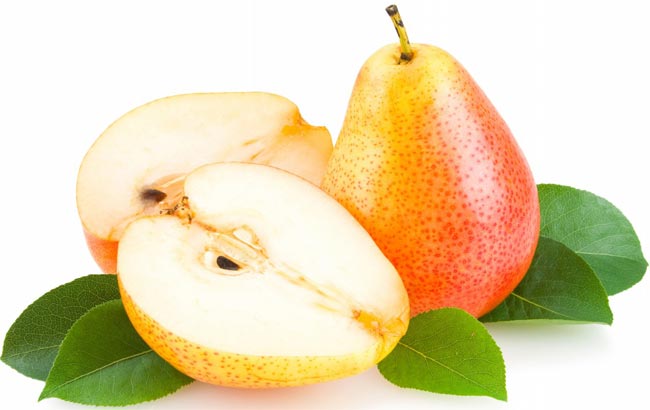
An infusion of pomegranate peel is effective. The crust must be peeled and washed in warm water. The peel should be cut and placed in a half-liter container. Pour two cups of boiling water. Let it brew for 3 hours. The composition is taken 70–80 ml three times a day before meals.

Diarrhea in early pregnancy
In the very early stages, nausea and vomiting often occur, which may indicate toxicosis in the first half of pregnancy. If these symptoms are accompanied by diarrhea, this is most likely a sign of either an error in the diet, or a chronic or (which is much more dangerous) infectious disease of the gastrointestinal tract.
However, can diarrhea be a sign of pregnancy? Sometimes - yes, it can be one of the dubious signs in the triad: vomiting, nausea and diarrhea. Although there is no need to talk about the reliability of such a sign, a hormonal transformation occurs in the body of a pregnant woman, which can cause the above-mentioned disturbances in the functioning of the digestive system.
If the situation is not under control
Natural physiological processes do not cause as much harm as diarrhea, which is accompanied by nausea, vomiting, fever and severe abdominal pain. In such situations, folk remedies and diet will not help, and diarrhea is simply dangerous, as it is a symptom of infection.
Visually you can note:
- An acute condition lasting up to 14 days, nausea and vomiting - this indicates the presence of an infectious and bacterial factor.
- Abdominal pain and upset bowel movements lasting more than 2 weeks.
- Chronic diarrhea lasting more than a month. The reasons for this lie in the inflammatory process in the intestines.
How to treat severe diarrhea? For a woman in an interesting situation, both the cause of diarrhea and its consequences are dangerous - especially large loss of fluid. Primary treatment is to restore water and electrolyte balance and prevent complications.
It is permissible for a pregnant woman to drink Acesol, Regidron, etc., these are water-salt solutions that quickly return lost substances to the body. The very first sign of a lack of water in the body is dry mouth; in the absence of pharmaceutical solutions, it is permissible to take a lot of clean water.
Diarrhea during pregnancy under the influence of pathogenic factors is dangerous both in the early stages and in the third trimester at 27-33 weeks. Treatment is carried out only by a doctor, prescribing medications that are as safe as possible for the woman and fetus.
What can you eat and drink?
On the first day of acute diarrhea, if possible, you should refrain from the usual first and second courses. You should drink plenty of fluids to replenish your body's water balance. You can drink: black tea, compote of blueberries, viburnum, dried pears without sugar, as well as rice water. From solid products - white bread croutons. In the evening, if you feel very hungry, you can eat a quarter of a portion of boiled rice in a mushy form.
For the second day, slimy soups and water-based porridges made from rice and oatmeal are recommended. Bread – in crackers or dried, you can use diet bread. To drink – tea, compotes, fruit drinks, pomegranate decoction, still mineral water. Vegetable broths and low-fat chicken broth are allowed. Fresh fermented milk products - kefir, fermented baked milk, yogurt (in an amount of no more than 150 ml per dose) - will help the intestines work.
From the third day you can eat stewed vegetables, steamed minced meat dishes, and soups made with low-fat light broths. All food should be neither cold nor hot. You should stick to this diet for about a week. In the future, you can smoothly switch to your usual diet.
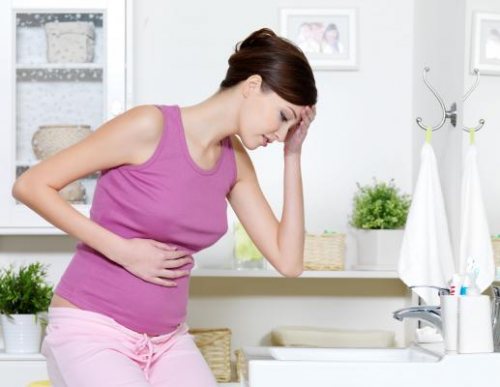
Diarrhea in the third trimester of pregnancy
During the entire third trimester, diarrhea is most common. If diarrhea begins two weeks before your due date, it may be a sign that your body is preparing for the birth process. If diarrhea occurs before the 36th week of pregnancy, this may be a sign of the onset of premature labor. Therefore, it is important to pay attention when diarrhea lasts longer than a day and is accompanied by one or more symptoms:
- abdominal pain of any nature;
- increased body temperature;
- the presence of blood or mucus in the stool;
- dizziness, weakness, dry mouth (symptoms of dehydration);
- decrease in fetal motor activity;
- vaginal discharge.
An ambulance should be called immediately, as the woman needs hospitalization for urgent treatment.
At 37, 38, and even more likely - at 39 - 40 weeks of pregnancy, diarrhea can exclusively be a harbinger of labor. If the above pathological symptoms are not observed, most likely this is so. However, the risk of poisoning or intestinal infection remains, so you should always consult a doctor.
Symptoms of diarrhea
There can be several causes of diarrhea - both minor, which are easy to eliminate, and serious, signaling a disorder or disease. Common factors that can be easily corrected include dietary imbalances. All you need to do to eliminate the ailment is to identify the product that caused the diarrhea and eliminate it from the diet.
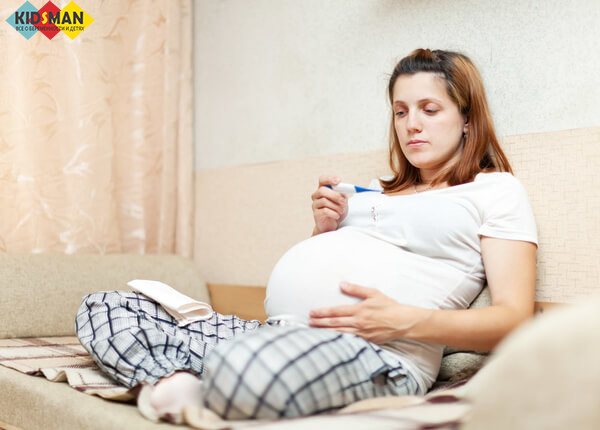
High temperature associated with diarrhea may pose a threat to healthy fetal development
Quite serious reasons include infection. It can irritate the gastrointestinal tract for a long time, leading to pain in the abdominal area. It is important for pregnant women to know what symptoms can be dangerous for the baby:
- Severe pain can lead to termination of pregnancy. When your stomach hurts, your intestines are overactive. This can lead to a chain reaction and force the uterus to contract, which leads to sad consequences - detachment of the fertilized egg and death of the fetus. If you experience severe pain due to diarrhea in the first and third trimester, you should immediately consult a doctor or even call an ambulance.
- Viruses and infections pose a danger - they penetrate beyond the placental barrier, affecting the fetus. This leads to deviations in the early stages, developmental delays, premature birth and even the death of the child. Therefore, it is important to figure out what caused the diarrhea.
- Diarrhea and high fever can lead to problems with fetal formation in the early stages.
- Severe diarrhea and vomiting lead to dehydration and a lack of vitamins. This threatens the baby’s development, and if this condition lasts for a long time, it can lead to congenital pathologies.
- If diarrhea is accompanied by nausea and general weakness, then this clearly signals intoxication of the body. Toxins in the mother's blood harm the fetus.
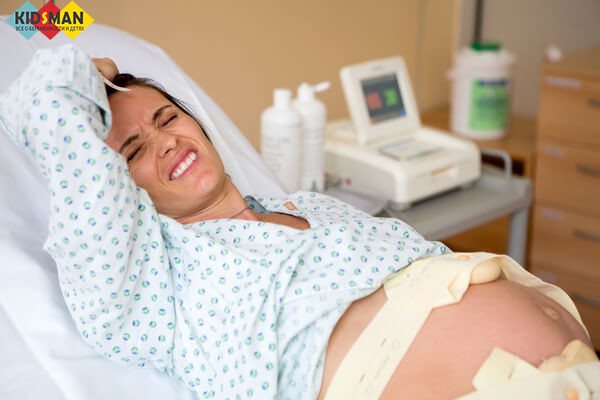
Nausea and dizziness with diarrhea are a reason to immediately consult a doctor
When diarrhea is accompanied by nausea or even vomiting, fever and weakness, emergency help should be called. It is also worth calling her if the pregnant woman feels dizzy, faints, the color of the stool has changed or there is blood or mucus in it.
In case of dehydration, hospitalization is required. To understand whether a woman’s body is dehydrated, pay attention to the following signs:
- dry mouth and constant thirst, even a large volume of water cannot quench it;
- dry mucous membranes and skin;
- weakness, drowsiness, dizziness, tinnitus;
- dark shadows under the eyes;
- dark urine and infrequent urge to urinate.

If a pregnant woman has diarrhea, she needs to increase the amount of fluid she consumes to restore water balance.
Unfortunately, it is difficult for pregnant women to treat diarrhea, because many medications are prohibited. But the doctor can act according to this scheme:
- examine the patient and make adjustments to the daily diet;
- prescribe safe remedies - for example, folk, natural ones.
Note! Even herbs should not be used without consulting a doctor.
When all else fails, the woman is hospitalized and medications are selected. They even use antibiotics if it is an infection, because otherwise it cannot be destroyed. Fortunately, there are medications that pose almost no risk to the fetus.

Under no circumstances should you prescribe medications yourself - there is a risk of harming the child.
How to treat diarrhea during pregnancy?
To restore normal functioning of the digestive system, the following are prescribed:
- adsorbent preparations – Smecta, Activated carbon, Enterosgel, Polyphepan;
- enzymes – Pancreatin, Mezim-forte, Creon.
To replenish the loss of fluid and salts, saline solutions are used: Regidron, Gidrovit, Normohydron.
After 35 weeks, to stop diarrhea, it is permissible to prescribe Loperamide (or its analogues - Imodium, Lopedium, Diara, Entrobene). These drugs help avoid loss of large amounts of fluid and salts. However, their use is unacceptable for infectious diseases. In cases of intestinal infections, pregnant women are allowed to prescribe Nifuroxazide. After a course of treatment, to restore the intestinal microflora, it is possible to prescribe probiotic drugs: Bifidumbacterin, Bifiform, Linex, Baktisubtil.

